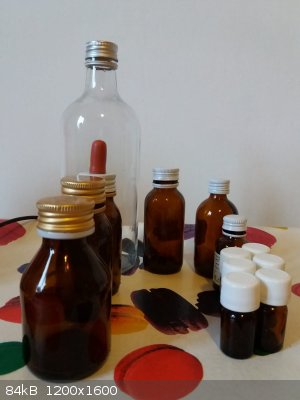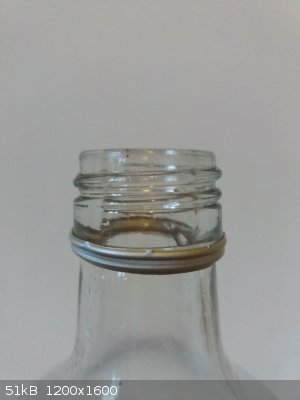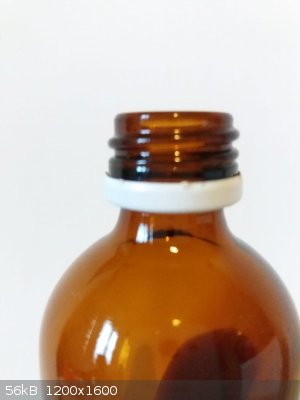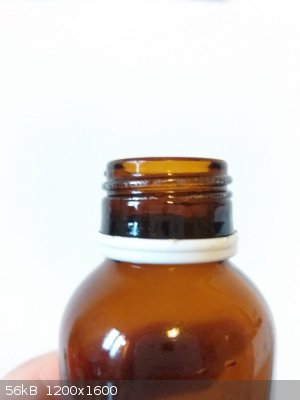Ubya
International Hazard
    
Posts: 1247
Registered: 23-11-2017
Location: Rome-Italy
Member Is Offline
Mood: I'm a maddo scientisto!!!
|
|
screw caps for storage bottles
storage bottles are expensive, and even if i can find a supplier for a reasonable price, or the shipping cost nullify any gain or simply i would need
to buy in bulk.
i don't need 100 bottles, i need random big and small bottles to store solvents. i thought of using plastic bottles but compatibility is an issue,
glass bottles would be perfect for every kind of solvent.
so here is the thing, i collected a few glass bottles from various sources (fruit juice, cough syrup, random medicines, etc), i think they would be
great for storing solvents, i just need new screw caps.
every glass bottle has this useless aluminium screw cap, that if you try to tight it too much it would simply bend and get loose.
so, how do i find better caps with compatible threads?
   
---------------------------------------------------------------------
feel free to correct my grammar, or any mistakes i make
---------------------------------------------------------------------
|
|
|
RawWork
Hazard to Others
  
Posts: 167
Registered: 10-2-2018
Member Is Offline
|
|
Come on man, why glass? When I was amateur chemist few years back, i wanted to use glass too, because i thought it's chemically resistant. Until I
found plastics are chemically resistant. All those chemicals like paint thinner, oils, shampoo, bleach, acids, alkalis come in plastic bottles. Just
like for cola or any normal juices and products. Except for hydrogen peroxide and potassium permanganate. Actually even they have plastic cap. Even
percarbonates (which are actually hydrogen peroxide + salt) come in plastic package. Polyethylene, polypropylene... They ARE chemically resistant in
most cases. Search google for "polyethylene chemical resistance" to find out more. Even such solvents as acetone, paint thinner (mix of common organic
solvents), MEK and oils come in plastics.
I also used glass bottles with plastic caps from plastic bottles. They fit perfectly.
[Edited on 12-4-2018 by RawWork]
|
|
|
Ubya
International Hazard
    
Posts: 1247
Registered: 23-11-2017
Location: Rome-Italy
Member Is Offline
Mood: I'm a maddo scientisto!!!
|
|
| Quote: |
Come on man, why glass? |
i know that many solvents are sold in plastic bottles, i actually store many of them in those.
so why glass?
well as i said compatibility, many plastics are perfect to store a solvent, but could be melted like sugar by another solvent.
glass is an universal solution, i don't need to worry about checking if my bottle is going to melt if i use a different liquid inside.
then what if i want to recycle the bottle and put in it something different from a solvent, like HCl, H2SO4 or HNO3?
many things are stored in plastic conteiners, right now i'm storing all my chemicals in plastic... i wanted to upgrade my storage quality without
spending 10 euros or more for a single small glass bottle
---------------------------------------------------------------------
feel free to correct my grammar, or any mistakes i make
---------------------------------------------------------------------
|
|
|
RawWork
Hazard to Others
  
Posts: 167
Registered: 10-2-2018
Member Is Offline
|
|
Well, H2SO4 and HCl come in plastics too. Even glacial acetic acid. It's fun how explosives and most extreme chemicals can be easily transported in
cars in normal milk or juice bottles or cardboard boxes. Police don't even think to open these. Even normal weapons if small enough and bullets can be
hidden inside. Drugs and poisons too. Of course some soft material to reduce impact sound should be placed inside too, and must not be to heavy. They
and their security 
[Edited on 13-4-2018 by RawWork]
|
|
|
Ubya
International Hazard
    
Posts: 1247
Registered: 23-11-2017
Location: Rome-Italy
Member Is Offline
Mood: I'm a maddo scientisto!!!
|
|
ok, but for example i'm planning on distilling some DMC from an OTC source, so i need an appropriate container, plastics won't survive and the metal
can it comes from it's not good for long term storage (rusting and leaking), so i need glass.
i will still use plastic containers, but sometimes i need glass and only glass.
the question still is the same
---------------------------------------------------------------------
feel free to correct my grammar, or any mistakes i make
---------------------------------------------------------------------
|
|
|
woelen
Super Administrator
        
Posts: 8035
Registered: 20-8-2005
Location: Netherlands
Member Is Offline
Mood: interested
|
|
I also prefer glass for general storage. Nearly everything can be stored in glass. Only exceptions are fluorides and dissolved strong alkalies.
Everything else can be stored safely in glass. For the cap I prefer PTFE-lined screw caps.
One very nasty problem with plastic is that it is a little porous. Even sturdy HDPE bottles are not completely trouble-free. I have had conc. HCl
(36%) in plastic. The plastic did not corrode or deteriorate, but I noticed that it always was a little wet and labels on it became crumbly and humid
as well, especially in winter time. The same issue I had with HNO3. This is because the plastic is slightly porous and HCl very slowly goes through
it. With glass you don't have this problem at all.
It also works the other way around. I once had a little plastic bottle, containing CrO3. it was perfectly and very tightly sealed. I forgot about
this, and when I needed some CrO3 two years later, I found that it had changed into a dirty dark brown sticky mass, while I had put it in the bottle
as very nice bright red dry flakes. The CrO3 absorbed water, making the air inside the bottle very dry and then humidity from the air goes in. This
process goes on and on and in the course of a few years the chemical inside is totally spoiled. Every chemical which is very air sensitive (e.g.
hygroscopic, very easily oxidized) cannot be stored in a plastic container for a long time.
So, a large group of my chemicals I store in glass bottles, with thick foam-liners and caps for tight nearly non-porous storage, and with PTFE-liners
if the chemical itself is very corrosive. Only chemicals, which are neither easily spoiled by air, nor are corrosive themselves I store in plastic
bottles (e.g. sulphur powder, CuSO4.5H2O, NaBr, NaCl, K2SO4, KClO3). Moderately hygroscopic chemicals also can be stored quite well in plastic
containers (e.g. red P, cobaltous nitrate, nickel nitrate, copper nitrate, ammonium chloride, ammonium perchlorate, sodium nitrite, zinc chloride
anhydrous). Really hygroscopic stuff must be stored in glass for long term storage (e.g. FeCl3 anhydrous, AlCl3 anhydrous, Na2O2) and easily oxidized
stuff also must be stored in glass (e.g. NaBH4, LiAlH4, CaC2, NaH, LiH, P4O10). Fuming acids also must be stored in glass (HCl, HBr, HNO3) and very
corrosive acids and other compounds must be stored in glass (H2SO4, HClO4, SO2(OH)Cl, I2, CH3COCl). The really corrosive stuff I store in glass
ampoules (Br2, SO2Cl2, SOCl2, PCl3, POCl3, PCl5).
|
|
|
RawWork
Hazard to Others
  
Posts: 167
Registered: 10-2-2018
Member Is Offline
|
|
It's scary to know that plastics allow something to pass through. So they are composed of air in between? Not only plastics, but maybe glass and
metals are dangerous and something can pass through them. Best example how can Ga pass through Al. I am seriously worried 
|
|
|
Ubya
International Hazard
    
Posts: 1247
Registered: 23-11-2017
Location: Rome-Italy
Member Is Offline
Mood: I'm a maddo scientisto!!!
|
|
yup, that was why i'd like glass, for example my HCl HDPE bottle is always moist on the outside, and everything made of metal near this bottle is
rusting.
glass is not porous so gases or liquids shouldn't permeate through.
---------------------------------------------------------------------
feel free to correct my grammar, or any mistakes i make
---------------------------------------------------------------------
|
|
|
weilawei
Hazard to Others
  
Posts: 130
Registered: 3-12-2017
Member Is Offline
Mood: No Mood
|
|
Qorpak makes excellent bottles, and you can buy them quite cheaply by the case of 12 if you order from basically anyone but them. I use their amber
bottles with the PTFE caps for most storage needs.
|
|
|
Ubya
International Hazard
    
Posts: 1247
Registered: 23-11-2017
Location: Rome-Italy
Member Is Offline
Mood: I'm a maddo scientisto!!!
|
|
Quote: Originally posted by weilawei  | | Qorpak makes excellent bottles, and you can buy them quite cheaply by the case of 12 if you order from basically anyone but them. I use their amber
bottles with the PTFE caps for most storage needs. |
i looked at Qorpak bottles for a long time, i think they are really good storage conteiners, but i never found any for a decent prize (plus shipping
to italy).
Qorpak bottles would be the best i know, but right now i'm a bit short on money, i can find many general glass bottles for free, i just need to
replace the screw caps and they would be ok for most chemicals
---------------------------------------------------------------------
feel free to correct my grammar, or any mistakes i make
---------------------------------------------------------------------
|
|
|
Sulaiman
International Hazard
    
Posts: 3738
Registered: 8-2-2015
Location: 3rd rock from the sun
Member Is Offline
|
|
Until you find a better solution you can use any cork or rubber or plastic stopper,
cover the bottom and side with kitchen cling film folded two or three times to give four or eight layers.
Not pretty, but it works.
CAUTION : Hobby Chemist, not Professional or even Amateur
|
|
|
JJay
International Hazard
    
Posts: 3440
Registered: 15-10-2015
Member Is Offline
|
|
I just buy Boston round bottles at the health food store and put Qorpak caps on them. It is cheaper than shipping the bottles from Qorpak.
|
|
|
zed
International Hazard
    
Posts: 2284
Registered: 6-9-2008
Location: Great State of Jefferson, City of Portland
Member Is Offline
Mood: Semi-repentant Sith Lord
|
|
Ummm. A trip to the University in quest of empty reagent bottles might be productive.
Walk right up to the Chemistry Dept. storeroom, and ask for empty bottles. "Got any?"
Failing that, in my neighborhood, in Portland OR., on many nights of the week, recycling is practiced. Folks put out boxes full of presorted glass
and plastic bottles, for trash pick-up.
Lots of folks, make the rounds, looking for deposit bottles and cans.
Utilizing a flashlight, you might be able to fulfill your fancy bottle needs, for the foreseeable future, via an hour or so, of scrounging.
Really good, chemically resistant caps? Well, you might just have to buy those.
At the University, bottles come outfitted with the good caps, elsewhere.... not so much.
My local Whole Foods, sells respectable Brown Glass, jars and bottles. The caps however, are ordinary.
[Edited on 16-4-2018 by zed]
|
|
|
RogueRose
International Hazard
    
Posts: 1596
Registered: 16-6-2014
Member Is Offline
|
|
I just found an online shop that sells all kinds of rubber and silicone stoppers/bungs/plugs. I have some glass media bottles that take a GL45 cap
and these seem to be really expensive by themselves but I found that these stoppers work well with them. IDK if something like this might help you
with the different sizes that you have and they are priced pretty well too!
http://www.widgetco.com/rubber-stoppers
|
|
|